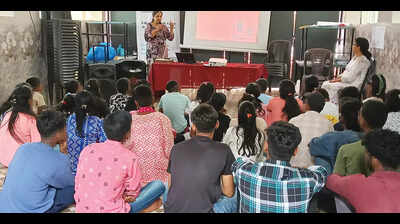ARTICLE AD BOX

Quepem: After Myra and her sister lost their mother while they were still infants, their paternal family enrolled them in a home run by nuns for children with HIV. Their father felt that his daughters, both of whom were HIV positive, would receive better care at this home.The sisters went to the home with no knowledge of their HIV-positive status. But even while the nuns waited for the children to attain a reasonable age to counsel them about their status, Myra and the other children from the home were already made to feel ‘different’ by some parents and teachers at their school.Myra is one of 60 children and youth, aged 8 to 24, living with HIV in Goa, who are spending five days at a residential camp at a farm in Quepem, to help them learn to cope with the subtle and not-so-subtle discrimination they are subjected to in daily life.“One boy from the home had a fall while playing at school and began bleeding profusely from his head. None of the teachers touched him, and called us, the other children from the home, to apply pressure on his head to keep the bleeding under control. No one even accompanied us. We walked alone to the home, from where the nuns took him to a hospital,” recalled Myra, now 21.“He was crying in pain, but no one even consoled him,” she said.
Myra remembers having to tolerate insults from a teacher and a couple of parents because of her HIV-positive status, and even not being involved in school programmes, making her not want to go to school.Raghav, 20, is also at the camp, organised by the Human Touch Foundation twice a year for different batches of children and youth with HIV in Goa.“I was sent to a home for children with HIV at 8, along with my two elder sisters,” he said.
“As a child, I liked playing football, but other children would not want to play with us, as they felt they would get infected. After completing my Class XII, my sisters and I are all back home and have found employment. But we live with our mother away from our family in a rented room,” he said.Most of these homes require children to leave once they attain the age of 18.Since 2014, mother-to-child transmissions in Goa have become very rare, said the foundation’s Peter Borges.
This has reduced the need for homes for children with HIV. But as the children who have been infected due to mother-to-child transmission are blossoming into youth, this throws another set of challenges.“The first thing people tend to ask is what is their life span, a question which should not arise at all, given the advances science has made,” said Borges. “Anyone born after 1995 can lead a completely normal life with HIV by regularly taking their medication.
Now, we are seeing that these children born after 1995 are entering their youth, and they are faced with many questions as they find themselves falling in love or looking for employment.
They worry about how to reveal their HIV status to the person they are in love with.”He said that antiretroviral therapy (ART) for HIV is known to interfere with cognitive abilities, which means that these children lean more towards skill-based jobs like the hospitality industry.
However, Borges said that the hospitality industry often makes HIV tests mandatory, restricting opportunities.Cynthia, having lived with HIV for the past 30 years and having faced ostracisation from neighbours and even family when her husband died, today helps youngsters living with HIV navigate life.“The children discontinue their education and don’t even want to go for employment. Goa being a small state, they are afraid of disclosure.
Disclosure may be seen as abnormal, and they may be thrown out of their job. Children even ask questions like ‘why me?’ We have counselling programmes to help them cope,” she said.Due to the disruptions caused to their lives like the early death of parents due to HIV, many children do not have even basic documents when they first reach NGOs like the Human Touch Foundation.“Even after counselling, children still return to us with questions like ‘will I die?’ At the camps we hold twice a year, children see others living with HIV and that in itself is therapy for them,” she said.Sarita, 23, was informed about her HIV status by her parents only after reaching Class XII. She soon plunged into depression. “After I attended my first camp, I realised that infection is not such a big deal, that you can live with it. I had put my dreams of running a business on hold. But after the sessions I completed my graduation, and have already tried my hand at two start-ups with friends,” she said.Fifteen-year-old Asavari also has big dreams. “I am at a hostel with children with HIV,” she said. “It is my dream to complete my education so I can become a teacher and support my disabled sister and my paternal grandmother, who regularly visits us at the hostel. My uncle’s family found it difficult to support me and my sister while we were home. Now that we are at the hostel, they are making phone calls again. If they were able to come to terms with my condition earlier, we could have lived our life at our home with our grandmother.
”(Names have been changed to protect identity)

 1 week ago
10
1 week ago
10








 English (US) ·
English (US) ·